
Maps and departures: points like constellations, or paths to hidden treasures. Departures from the traffic city and lovers bundled in black. Headlights in the night, we are heading out west, the furthest that I have ever gone: to the land suspended between nations and identities, between faiths and histories. My hands are so dry they are cracked like turtle shells, exploded and useless. The train is racing.
A conversation with my top-bunk neighbor. He will travel the three days in his suit. The man beside me is a punk with really busted teeth, chanting his music in the night. Outside the landscape flashing.
La bêtise humaine a était greffe dans la terre ici. C’est la montagne et les fleuves qui en ont pris pleins la gueule.

Song Yu Zhi, my traveling partner thinks that this place (China) is volatile, that everything can explode violently, cave in onto itself: a collapse of the apparent calm. The capital cities are funambulists uneasily balanced above violence and poverty. He wonders, what is an education that pushes everyone to go to university and then go abroad? He says that education in China today pushes everyone not towards knowledge, critical thinking and society building, but towards the competition for financial success. A dangerous brew, when the sought-after exuberant wealth is inevitably scarce.

We are skipping across the country: Xian, Baoji, Tianshui, Lanzhou. A place seen from a distance is like any other, but how nice it would be to spend a day walking along Gansu’s frozen hillsides. This land has been worn down and wasted. It is old, lame soil, one that can not give life to the eager, growing masses. (And so we are picking up the excluded and the lonely and bringing them on our silver dragon to the new territories. In the vastness of a conquered land they shall be given jobs and land). The world is passing by, distant like a silent movie: the barriers of glass and movement. Before us a sad mountain of golden sand broken by shadows.

Song Yu Zhi says that this is a land of peasants, a country of farmers. He says there is no intellect here, no creativity. He is hard on his land, his home. I have been traveling among the success of economic growth, and had forgotten that nothing is magic. But he reminds me that there is both danger and beauty in traditions: old traditions, crafts and gestures anchored in the land, repeating the same stories, ideas and rules for centuries. Centuries lost in rules and regulations. Perhaps it is this routine, this acceptance and passivity that the communists wanted to break? Bang!
A table mountain ribbed by shadows and sun. The construction project at its feet looks like a play-mobile game below a natural stronghold. One day the mountain will reclaim its base with a threatening crush. The mountains are rising slowly, and our path is lengthened by the detours of valleys. Flat houses congregated in every inch and fold of the land. The sand mountains become deserts to the north.

Slipping on my sweater. We have awoken to snow mountains and colder lands powdered white: inviting. A twisted iron factory in the foreground, and further, endless folds as if the hills were hiding a treasure. The earth is conspiring to add texture and distance. But the hills are still low enough to divine the wide and I feel the plains and plateaus of the Himalaya to the south: tempting.
We are piercing through white. Small red bushes ferociously fighting frozen beds. It will be nice to eat the first bowl of Xinjiang noodles. “Jia Ge Mian”.
We race into a 20.5km tunnel through the mountain, saving us a 100km detour around the base. Ear pops and we are again out of the dark. I am remembering a summer party, when the young French man gave his fedora to a beautiful girl, and the next year returned unrecognizable.
This is a night crossing of the Gobi Desert
In the morning light, it is a moonscape where man has left traces, derisory for their smallness: a scratch on the surface of a deep continent. This landscape is vast, impenetrable, infinite. I can imagine the sound of caravan bells. This must have been an incredibly fertile plain when the water still flowed.

Here all the elements are left to surface: water, wind and fire play with the farce of human life. Last week this train was turned over by the wind. (Four deaths and other men still missing). The winds here pick up boulders and carve out mountains. Who are we to dare a crossing? I have come only to see the shadow of a mountain rising beyond the grey and golden expanse.
The men in my compartment are talking. Bears in the Altai Mountains have evolved to use tools, they say. They have learned to throw stones at buffalos and are known to hang camels on tree branches to eat them slowly. This is the wilderness we are approaching – one for which the Hans have legends and deep fears: a wild natural land without the cement comforts of home. We are on a train packed with Han. In Urumqi, we shall do the unloading. Numbers shifting with each train-load: a Chinese colonization.
We talk about the price of real-estate in each of China’s cities. Kunming 2,000-3,000 RMB/m2, Urumqi 4,000, Shanghai 24,000, Beijing 10,000. shuffling prices and lifestyles.

Outside, cement roads carved through sand and gravel, in a few decades they will be under a sea of sand. Oil wells and burning gas. Just outside Urumqi, a field of windmills. The Tian Shan (Celestial Mountains) come closer. We have arrived.

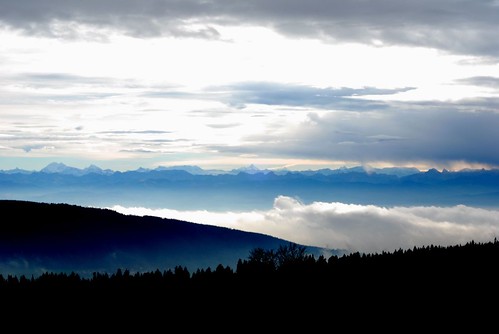
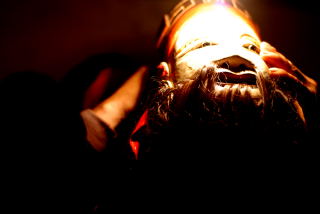
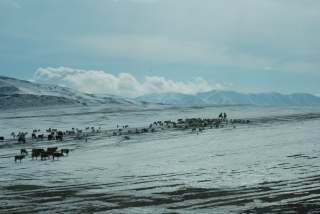
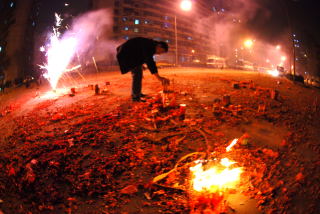
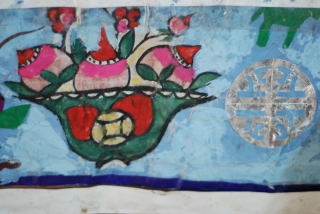

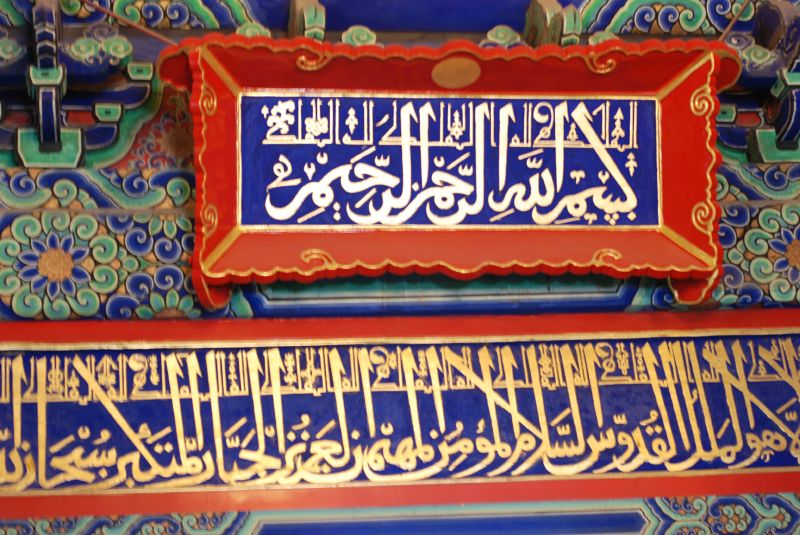
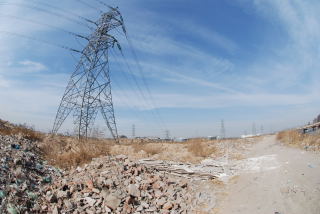
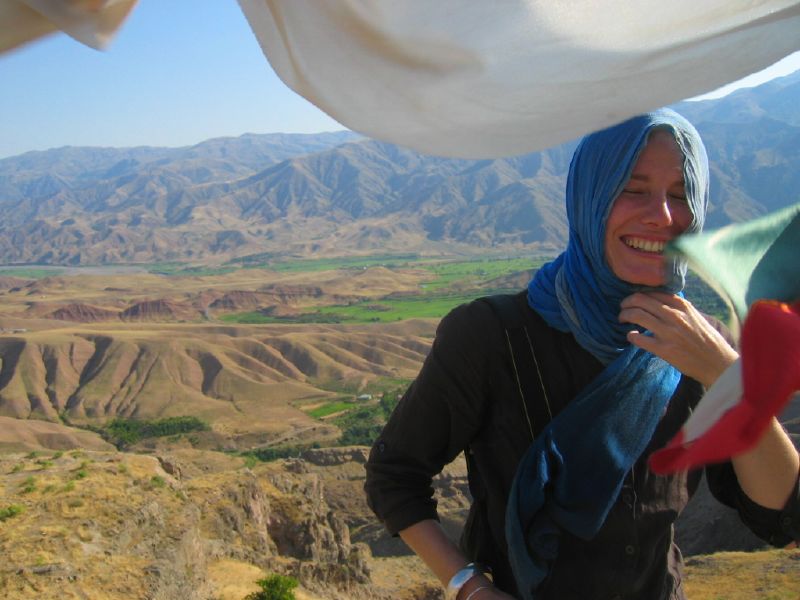
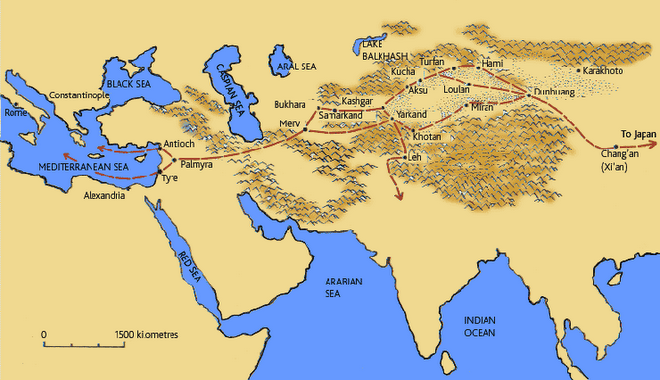
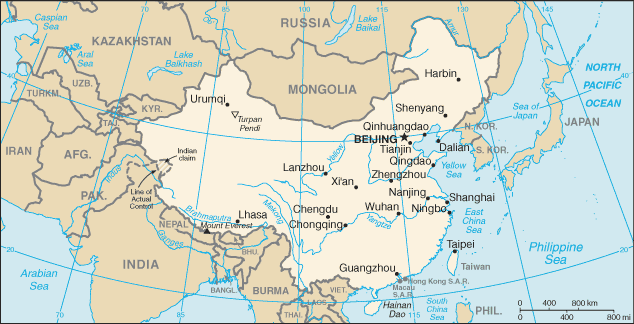
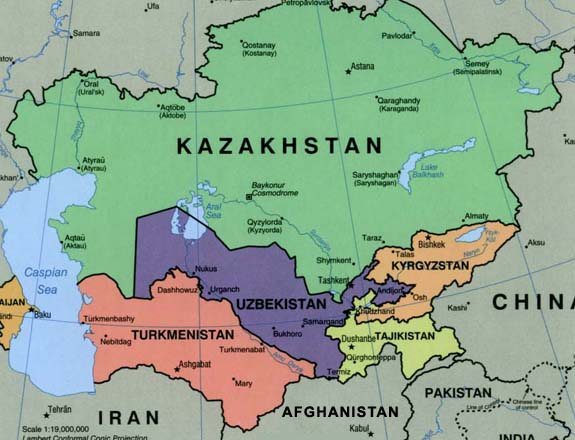
No comments:
Post a Comment